Walker

Paul Gavarni: Man Walking (circa 1852-1866)
" … winning non-existent races, going places."
Back in the seventies when I began my second career, I still believed in the predictive powers of assessment surveys. Often advertised as psychological tests, whatever that might have been (which they weren't), they claimed to be capable of assessing what sort of a person you might be, for purposes of matching natural inclination to specific job situations. An employer, for instance, would not want an egghead in a meathead job because the egghead might over-think everything rather than mindlessly comply with directions. A popular "tool", as they were referred to, designated some individuals as Ds, or Drivers. My primitive conception of leadership at the time encouraged me to think of the Drivers as the real leaders and the others, the nurturers and philosophers and analysts as somehow further down the pecking order and therefore not really leading. I found that if I answered the survey questions not as I knew myself to be but as I aspired to become, I could easily score as a nearly perfect Driver and thereby reinforce my primitive notions of leadership while also satisfying myself. I reported to a wiley boss who saw right through my ruse without challenging me on it. She figured, I guess, that I'd best teach myself different if I was ever going to amount to much.
And so I fancied myself a Driver.
Jerry

Rembrandt's stolen masterpiece: The Storm on the Sea of Galilee (1633)
" … a long lost friend forever."
I received last night the news of the death of a long lost friend. Jerry was lost when we first met and to my mind never really managed to find himself, though he would have doubtless disagreed with that assessment. I considered him for a time a dear friend before he became a feared one, and his story might serve as both cautionary and explanatory, for it carried a not uncommon theme of the time. His story speaks to the deeper cost of war and a paradox of justice, where punishment sometimes proves more punishing than any original crime warranted.
When Jerry was seventeen, still in high school, he was charged with stealing some records from a local drug store.
Roostering
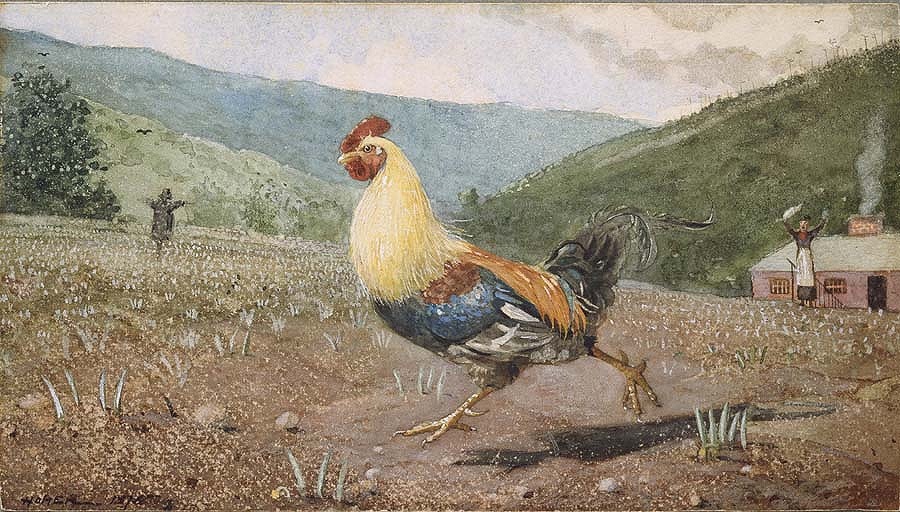
Winslow Homer: The Rooster (1876)
" … my Roostering's finished just before The Muse's day begins."
The neighbor's rooster starts crowing two hours before dawn, every blessed morning. I'm almost always already up by then, anticipating my day, finishing my writing. Both that rooster and I seem to possess an active anticipation, he, an internal clock, and me, a sense that I cannot quite grok. His kind served as the original alarm clock. My kind just woke up earlier than almost anybody and set to work. It might be that the work I do cannot be performed in the full light of day, but can only emerge in faint light or anticipating light, only out of near darkness. Some might insist that the rooster's cursed to never enjoy a full night's sleep, but I suspect that the rooster would disagree, as would I, for enjoying sleep seems to require having finished working and never entails avoiding it. One might fitfully attempt to sleep with unfinished work, but probably won't enjoy it.
Lately, as my life's focus has shifted from the etherial into the more practical, my early morning ritual has seemed less important, less urgent.
DIY

Mihály Munkácsy: Yawning Apprentice (1869)
"We're none of us islands of skill …"
The Muse, who serves as the grand designer of our great refurbishing effort, makes most of the decisions because she holds the vision. I'm not just trailing behind doing her bidding, but I'm careful what I initiate, to make sure that I've communicated what I'm attempting. It's genuinely shocking how often I find that we have not reached agreement or that my notion was somehow unconscionable once I mentioned it. She chose the color after I'd set up and painted the boxes to demonstrate how they played together. I'm learning how to become indifferent to many details. Color's not my remit. Neither is style. I contribute my part without trying to take much in the way of credit, either, for I'm not doing very much by myself or even for myself. I think of myself as bringing a certain flare, a studied style of execution, often so subtle that nobody should ever notice its presence. My doors can't rival those Kurt Our Painter finishes, but they're good enough not to stand out as amateur productions. Even Kurt consults with me, as I continually consult with him, both of us serving as if not servants, then apprentices to some larger context, one only The Muse understands.
That's not to say that she's not persuadable.
GreatGoodFortune

Li Gonglin: The Classic of Filial Piety (circa 1085)
" … had we been as prescient as the venerable I Ching or a decent Tarot reading, but we weren't."
Earlier in my careers, I was forever trying to foresee what was coming next. I consulted The I Ching and various forms of Tarot, each of which use language unique to them. The I Ching, for instance, was forever speaking of GreatGoodFortune when indicators suggested a likely positive result. Eventually, though, foreseeing came to feel like taking a blood pressure reading in that it doesn't work if taken too frequently and might be accurate only to the degree that it's rarely taken. One can live in the future and miss the present just like one can lose their present in their past. In times of peril or uncertainty, I'm still not above or beyond trying to sneak a peek through the veil, but I most days proceed forward without attempting to peer around upcoming corners.
All that said, I'm presently experiencing a prolonged period of extremely GreatGoodFortune, one ingredient never ascribable to talent or skill.
Consequent
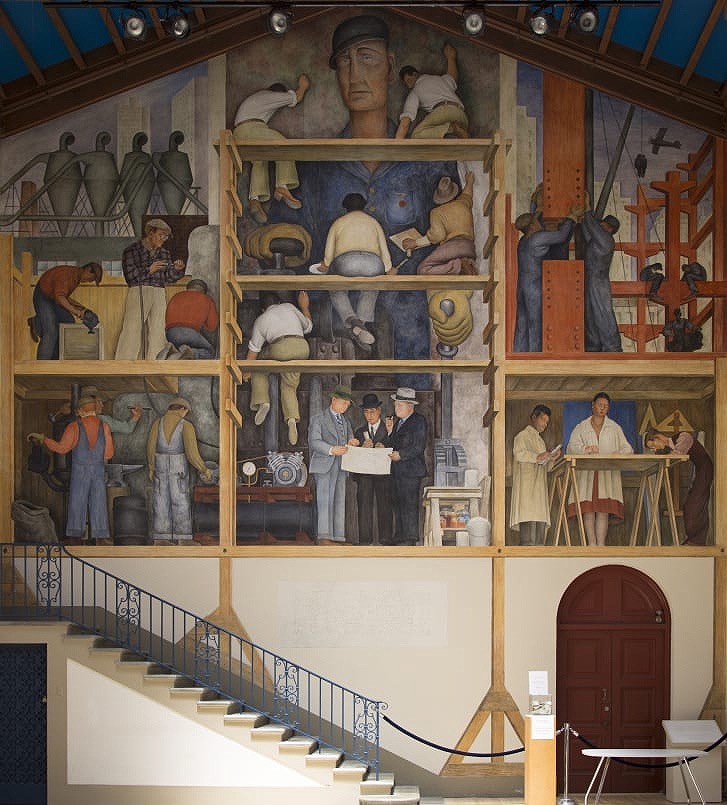
Diego Rivera: The Making of a Fresco Showing the Building of a City (1931)
"If we can't make this fun, they won't find it worthy."
The early effort seemed unfocused for it sought first to figure out what needed doing and in what particular order. I contend that there never was any orderly way to determine order. It's inherently messy business. One dabbles at first, poking here and prodding there until a rough order emerges. Some rework usually results, with luck, little, without, perhaps much. We have been inordinately fortunate on this refurbishment effort, which I take as a sign that we're engaged in a right and proper undertaking. It seems to me that if I'm engaging in right work, good fortune naturally accompanies me. Great good fortune, which characterizes what we've been experiencing, seems as if a blessing from The Gods or something. Little has discouraged us so far. It's been Kurt Our Painter and I, with me struggling to keep up with even our modest initial pace. Once Joel Our Floor Guy (he's actually a finish carpenter) arrived, our previously languorous pace exploded.
I'd noticed this same effect on many of the projects with which I'd once led and consulted.
MannerOfWorking
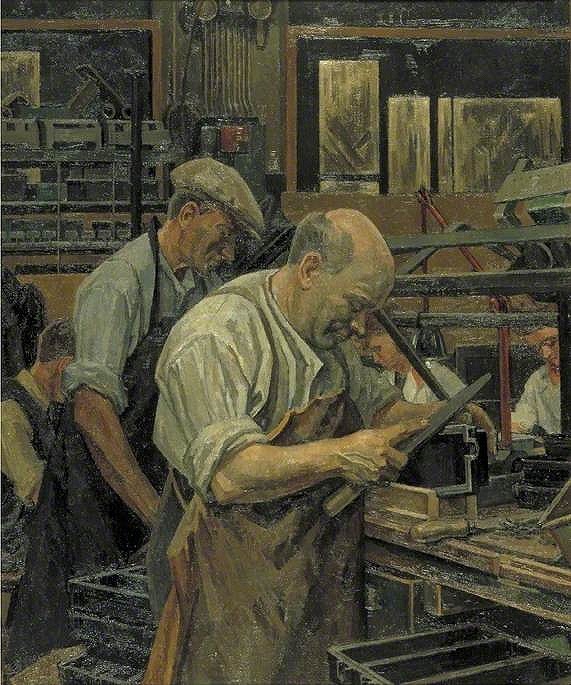
Percy Frederick Horton: Blind Workers in a Birmingham Factory (Circa 1940s)
"What approach am I deploying as if it was essential?"
Five weeks into the Villa's refurbishment and I've started questioning my MannerOfWorking. Early on, I could engage productively and mindlessly, an easy feat since I was inexperienced doing most of the work my assignments entailed. I was just learning to pull nails from the bottom of boards so I didn't yet know enough to consider embellishments on the standard brute force. Kurt Our Painter introduced me to what he believes to be one of the absolutely essential tools in his considerable arsenal, The Big Fucking Pliers. The BFPs are not for fiddling with nuts and bolts. They bring a measure of brute force to a task. Cast forged steel, they weigh heavy in the hand and prove handy in a hundred ways, one of those being pulling countersunk nails from baseboards. One could choose to pound out those babies and remove them with a crowbar or hammer, but why bother with messing up the board face when it's possible to just remove those nails by the tail, preserving the smooth board face and limiting the damage to century-old fine-grained trim wood? After a few sessions of nail removing, I began to notice different possibilities. Then I began to remove nails more easily. I'd become a more experienced hand.
The story's the same with refinishing doors.
BackOrdered
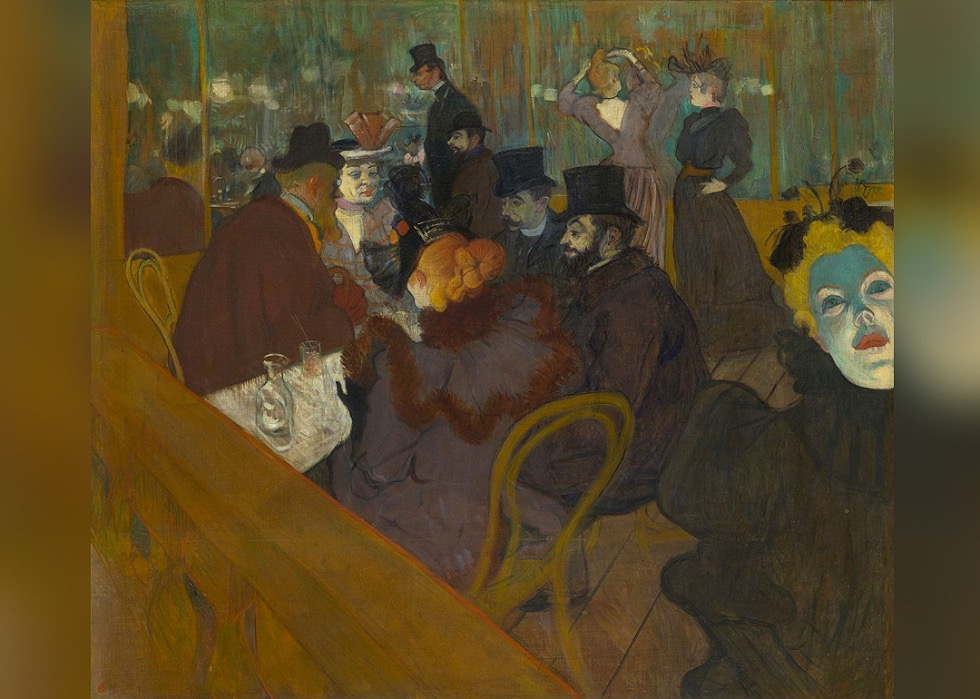
Henri de Toulouse-Lautrec: At the Moulin Rouge (1892–95)
"I have been an unworthy beneficiary …"
I told The Muse that her birthday poem was back ordered, probably on a container ship held offshore at Long Beach until a dock opens up and then dependent upon a driver being available to transport it from there to here. Who knows when it might appear? It's been a queer year, and especially odd for refurbishing this old place, since supplies have been in historically short supply. The glass guy reports shortages of glass, for instance. The paint store had six gallons of the base I needed when they should have had hundreds, here in the middle of high painting season, and even then I'd had to upgrade to a more premium version. The doors and windows we ordered in April might not arrive here this year. If they arrive earlier, the installers are over-scheduled and unavailable at any price. Everything's in short supply. I bought three preemptive gallons of trim paint I didn't quite need yet to prevent running out in the future and shutting down our refurbishing efforts until who knows when. Nobody knows. We're all torn apart here and cannot wait long to achieve complete enough to close up for fall and winter. Closure's also back ordered.
My creative spark seems on back order, too.
Sublimating

Wojciech Siudmak: Door (1999)
" … probably something even better!"
When I was in my early twenties, I took a job as a pot washer, the lowliest job in the kitchen. My work station was in the grimy basement beneath where the chefs reigned, adjacent to the service elevator which brought me a continuous stream of freshly-ruined pots and pans. I had not taken the job with the aspiration of advancement. I was at the time convinced that I was a songwriter. I took the job to support my songwriting, which I firmly believed would eventually bring me fame and fortune. That job served as a medium and not as an end unto itself. It turned out that I had a penchant for the work. I declared myself The Pot Wizard and challenged all comers to try to dirty a pot in a way I could not conquer. Nobody ever did.
I learned more while washing pots than I learned at university.
Changing

François Boucher: The Interrupted Sleep (1750)
"I don't need a world or a home that doesn't seem to need changing …"
While painting yet another door front yesterday, I started thinking about all the changes The Muse and I have visited upon this old place over the twenty years we've owned it. Once we complete this current refurbishment, we will have changed flooring in every room except the basement's, every room's wall and trim color, removed and refinished or replaced every window, rebuilt the back porch, stripped the exterior to bare wood and repainted it, torn off four layers of roofing and replaced sheathing as well as roofing and gutters, repointed the chimney, replaced the front steps and entry walk, replaced half of the front retaining wall, replaced the heating system and added central air conditioning, repainted the surrounding fence, and extensively reworked every garden. We will still have a list remaining of future changes to make. As near as I could see from my pop-up paint shop, we had been Changing only superficial surfaces, not the house. It would look like a falling down wreck had we not completed those efforts, but they changed little. It seemed to me while leaning over that door that we had been more putting the place back into order than changing anything. Time had attempted to change it, maybe entropy got involved, and we just restored it to some state closer to its original condition if not precisely into the same configuration.
When removing the regrettable wall-to-wall carpeting, I found the place's bones lurking underneath.
Eldering

Rembrandt Harmenszoon van Rijn: Bust of an Old Man with a Beard (circa 1630)
" … mending doors might teach me all I need to know …"
I went from being a man of modest middle age to an elder in a single day, the day I turned seventy, a day which might well have lived in infamy as long as it lived, which was the usual brief twenty-four hours. How should I have responded? I very cleverly pretended that nothing had changed, but only because nothing had changed. I didn't need to pretend because I couldn't see any difference between who I'd been the night before and who I found in my skin the next morning. Yet there I was, clearly within elder territory but without a clue about what I was supposed to do to fulfill my new role's responsibilities, which, I note, were foisted upon me without my consent, just like middle age's had been foisted upon me, and fatherhood's, and adulthood's, even teen-age's. I know how this works. It starts with no discernible difference and ends in denial of even the more obvious changes, a slow fading forward, a one-way road toward oblivion.
The older, the more precarious the balance, the more conservative one becomes.
Easy

Raphael: Detail of Pythagoras with a tablet of ratios, from The School of Athens. Vatican Palace, Rome (1509)
"I'm not working myself to death here, but working myself to life."
Since I started working on this latest refurbishing project, I've received many well-meant messages asking me to not work too hard, wondering when or if I was planning on taking a few days off. I've mostly left those messages unanswered, as if their questions had been rhetorical, because I had no idea how to even begin answering them. For me, days off usually come as the result of some injury or infirmity and not for the purposes of recreation. I look through my garage and notice that I own none of the usual recreational equipment common to a fellow of my age and social class. No golf clubs, heaven forbid. No tennis racquet, thank heavens. No basketball. There's an old baseball mitt in there somewhere in the unlikely event that I find someone interested in playing catch. That hasn't happened in twenty years or so. All those years in Colorado, I never once felt in any way interested in skiing or fly fishing or mountain biking or white water rafting or parasailing, or any of the innumerable other ways people engage in recreation there. I don't have hobbies, either.
I do have my work, which has long been my life.
Outventory
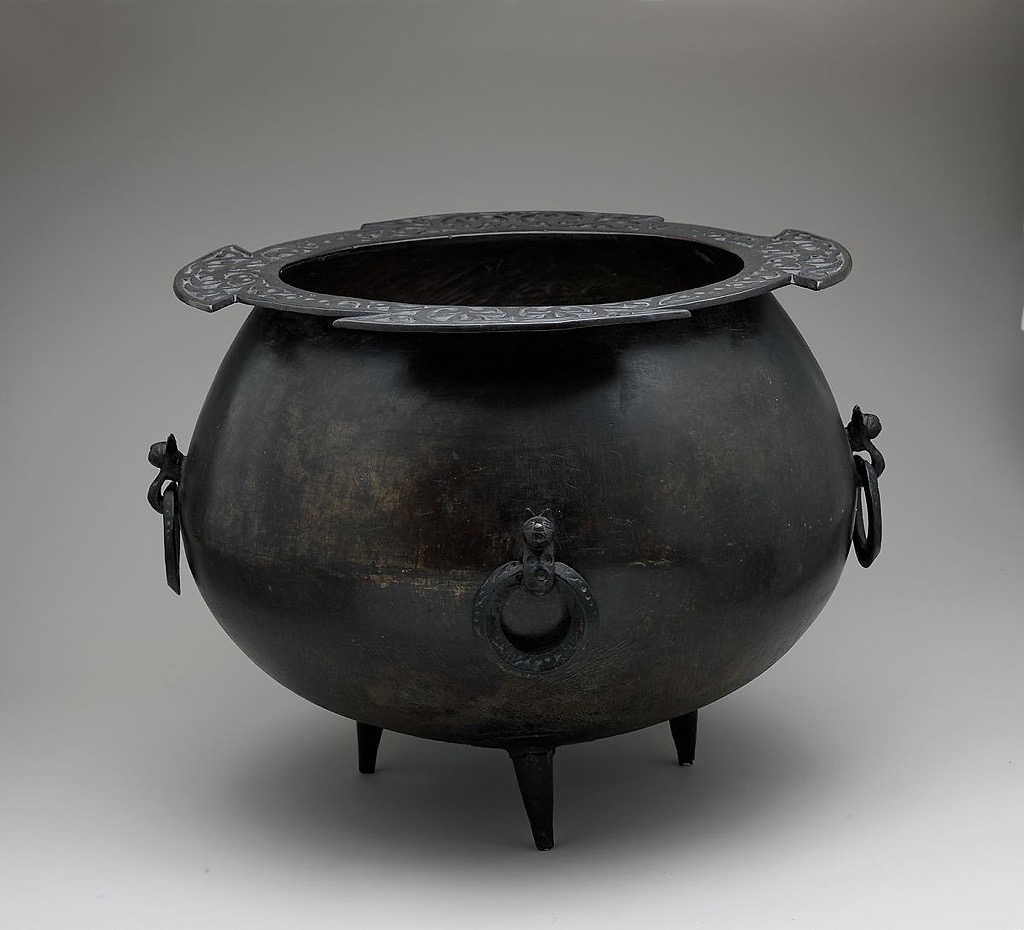
Unknown, Cauldron (mid-15th century)
" … both my product and my reward."
I've lately been seeing a lot of writing about the downsides of openness and transparency, both long touted as unconditional goods. Nobody really needs to know most of the picky details about any other. I do not, for instance, care to know what you really think about anything. I much prefer polite pseudo conversation to full disclosure confession. I'm fine with the persistent illusion that you're fine, just like you say when I ask you. I'm good if you think me a generally decent fellow, not given to unruly excess or extremist ideologies. You can think whatever you care to think about me as long as you do not expect me to live up to your fantasies about who I am. I have been mistaken for many things in my life. I have likewise been recognized for precisely who and what I am on multiple occasions, each surprises. We seem to so easily slot ourselves into some role or persona that we might not notice when our halos slip sideways a little. We rarely seek to set any record straight. This morning, though, it being the morning of my seventieth birthday, I intend to attempt to take a little public inventory of what I've managed to make of myself, with, of course, The Muse's generous help.
I eat beans for breakfast.
Achings

Benjamin West: The Expulsion of Adam and Eve from Paradise (1791)
"I've lately been spending my days making fresh Achings …"
I measure progress in aches and pains. A fresh and novel twinge in my back means that I must have done something different yesterday, something to engage a part of my body my earlier activities had not. Through the carpet removal period, a reliable set of complaints followed each day's work. Some of them evaporated beneath a shower, but most hung around at least long enough to see what we were having for supper that night, and a few would spend the night, cuddling right up close as I fell into my early bedtime. A few of my oldest friends wake with me each morning and remind me that I'm still not quite as young as I used to be, thank heavens. I remember times when I could lift and toil all day without carrying away even the tiniest little infirmity. Now, I barely need to think about engaging and my lower back knots up a little in anticipation. I tell myself that I'm alive and alive feels like twinging, it's eventually a welcome and unresolvable Aching, equal parts longing and savoring.
This refurbishing effort has been teaching me to revere my Achings.
Tiling

"The Good Shepherd" mosaic in Galla Placidia mausoleum.
UNESCO World heritage site. Ravenna, Italy. 5th century A.D.
" … one blank space which allowed shifting those tiles into any order."
We refurbish a mosaic featuring movable tiles. We shift our possessions, which serve as our mosaic's tiles, from place to place, room to room, as we prepare each space for what will have to pass for transformation this time around. We emptied the entry hall first, a modest push even with the piano. Everything easily shifted stage right into the front portion of the living room, the once and future music room, currently storage only frequented by the cats, who've found nests among the warren of boxes. That room's along the only remaining passage through the house, a narrow bridge between kitchen and front door. It might soon be easier to just go around the house outside.
The upstairs hall went next, stripped of carpet and baseboards, light fixtures dropped, doors removed from frames, then each room in turn, five in all up there, four of which have been repurposed into either fallow space awaiting baseboard removal or storage space holding everything from other rooms.
ToldYa

Coloured lithograph by R. Carrick after Lieutenant James Rattray:
Men in the decorated palace of Shah Shujah Ool Moolk, Afghanistan (c. 1847)
"Maybe I was only trying to tell myself but couldn't listen."
As of this writing, we have entered the ToldYa Phase of the nearly two decades-long conflict in Afghanistan, a discretionary conflict we chose to begin then lost from the outset. We fed this conflict for longer than any other war in the history of this country, which says something about dedication and commitment, though little about reasoned judgement. One could speculate that this outcome—the country overrun by Taliban forces we and our allies were only ever able to keep at tenuous bay and us humiliated, was the originally intended outcome of the conflict, and that creating the conditions which led us and our allies to invade that country were the true purpose of the infamous 9/11 attacks. It wouldn't have taken a genius to predict that our response to that insult might easily encourage us into some of our historically infamous self-destructive behavior. We'd done it before in Vietnam, Panama, and Granada and would do it to ourselves again in Iraq, even while still in the middle of our "adventure" in Afghanistan, even though The Soviet Union and The British Expeditionary Forces might have already successfully demonstrated our likely folly in engaging in what we euphemistically referred to as "nation building" there. We produced an occupation, never a nation.
I'm not suggesting that had the conditions been different, we might have managed to encourage more permanent good, but the world was never different than it had always been, regardless of the insistences of people who probably knew better but could find no more convincing argument to engage.
SceneQuesting
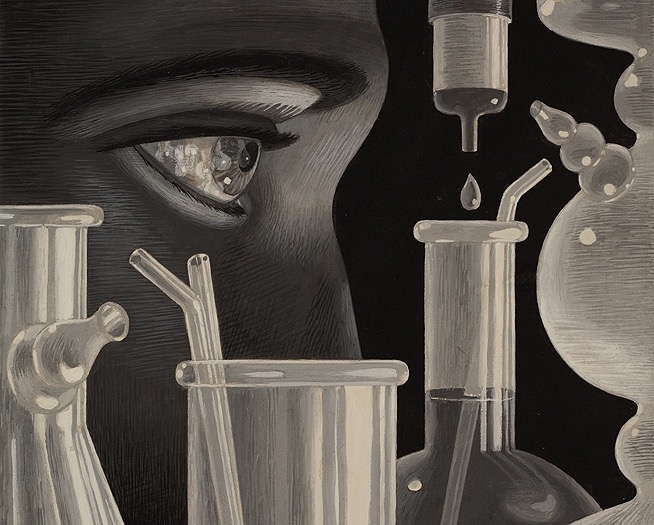
John R. Armstrong: At Your Service (1940s)
"I only know for certain what I haven't found for certain yet."
I catch myself fussing over more than contributing to our refurbishing effort. I seem to need to play through alternative scenarios before choosing if not the best of them, at least a less-worse one. To us unlearned and unwashed, the natural sequence of tasks seems at first mysterious. I might be able to envision a task as how it should appear when completed, but that end in mind does not define the sequence of actions necessary to produce that end state, and there seem to be an infinite number of alternatives from which to choose. I feel fairly certain that if I can only imagine one way to skin any particular cat, that my narrow imagination probably means that I have no business skinning that cat yet. I might grant myself permission to start skinning only after considering a few alternative scenarios for sequencing the work and choosing if not The Best, at least a less worse-seeming alternative. Refinishing one door, the sequencing hardly matters. Plan on refinishing a dozen, and a process emerges. Queues appear: untouched, prepped, primed, finish coat one, and finish coat two. The need for storage space and its availability limits possibilities. So do the number of pairs of saw horses and wait time between drying coats of paint. A complex set of choices quickly emerges. These choices comprise the bulk of what I fuss over in lieu of actually contributing to our refurbishing effort.
I suppose that my fussing might eventually add some value, though if I was drawing a paycheck from this work, I'd expect my employer to be bothered by how much effort I seem to expend while laying down with my eyes closed.
MartianLight

Edvard Munch: The Scream (ca. 1910)
"I'm seeing with my hands …"
In ordinary times, The Muse and I would have plotted a day trip up into The Blues to pick wild black currents which grow in profusion along icy streams which feed into the Tucannon River. This year, that whole area has been cordoned off due to extreme fire danger. That country's on fire. The trail we walked back in March just after we arrived "back" home, searching for morels that were not there due to record drought, might have burned over again. It had burned a few years back. Down in town, smoke obscures even the rumor of sky, even threatening the concept of up. Horizons fade into similar nothingness. The usual view of the foothills from our back windows overlooks nothing but haze, with no hint of any proximate elevation. The heat which has been sitting on our faces for six weeks continues undeterred and perhaps encouraged by the poor ventilation.
My door and window refurbishing shop, set up in the driveway beneath a pop-up canopy, swelters after ten o'clock.
Repurposing

George Julius Poulett Scrope: Artist's impression of the eruption of Mount Vesuvius in AD 79, depicting what that eruption may have looked like. Lightning is depicted around the rising column of ash and gas. This eruption produced massive volumes of pumice.(1822)
"We could always use the wishes coming true."
We are not so much remodeling the Villa Vatta, but Repurposing it. I learned from a note scribbled on the back of some wall-to-wall carpet I removed that the middle upstairs bedroom had at one time been referred to as "the girls' room." Carpet replaced with vinyl planking, that room will proceed to fulfill another role in our lives. The kitchen, once a testament to misplaced mid-century modern design seems more timeless since we repurposed it three years ago. The dining room will remain the dining room after repainting, reflooring, and replacing light fixture and crown moulding, but it should appear a bit more formal than it did when carpeted. Along the way, various items find new purposes. A door, for instance, is no longer just the door it was, once I've contributed a little sweat equity into refinishing it. It becomes a work of art, an expression of adoration, infused with fresh meaning for me and this little rag tag family.
Kurt Our Painter mentioned earlier on that in the old days—he's a living bridge between the way it used to be and how its become, just like everyone our age—painters refinishing doors and anything with small mouldings used a piece of pumice to sand those fine surfaces smooth.
Insignificants

Jules Bastien-Lepage: Study for “Les Foins” (Haymaking) (1878)
"It's a stretch to show The Muse that we're making progress."
Reviewing progress on our grand revamping of The Villa Vatta Schmaltz, I feel struck most by the utter insignificance of most of what we've accomplished. Our progress has manifested exclusively via insignificant increments, tiny steps rather than big bold moves. Not even our brush strokes have qualified as broad, but narrow, tight, and tiny. This army marches forward on its fingers. The skill in this work does not come from grand planning but modest execution, from keeping the scope simple and easily grasped, from finding satisfaction in taking baby steps and delaying gratification. Should we break our discipline and attempt to accomplish something big, I suspect that we'd break the trance that's held us steady and the whole project would digress into irrelevance. Relevance must also come in Insignificants.
I disappear when Kurt Our Painter invites me to contribute anything bordering on the relatively meaningful.
Haunting

Jan Steen: Soo voer gesongen, soo na gepepen ["As the Old Sing, So Pipe the Young"] (c.1668–1670)
"When I vacuum Fairy Dust, much of its magic remains."
Refurbishing a hundred plus year old home immerses me in The Great Mystery. We know bare details about who built this place and almost nothing about who remodeled it over time and why. Motive seems particularly unclear where original intent seems to have been circumvented with little apparent benefit. Why narrow doorways and trim? Why Georgian crown moulding in an Arts and Craft room? We think the less of whomever undertook these efforts and set about attempting to undo them, presuming that we somehow better understand the original owner's intentions, though we certainly have no clue what they thought they were doing. Building this home must have been an enormous undertaking. Certain shortcuts were most probably taken. We're taking a few ourselves.
One piece of one of the venerable double hung windows had gotten wet, swollen, and needs replacement.
OtherSide
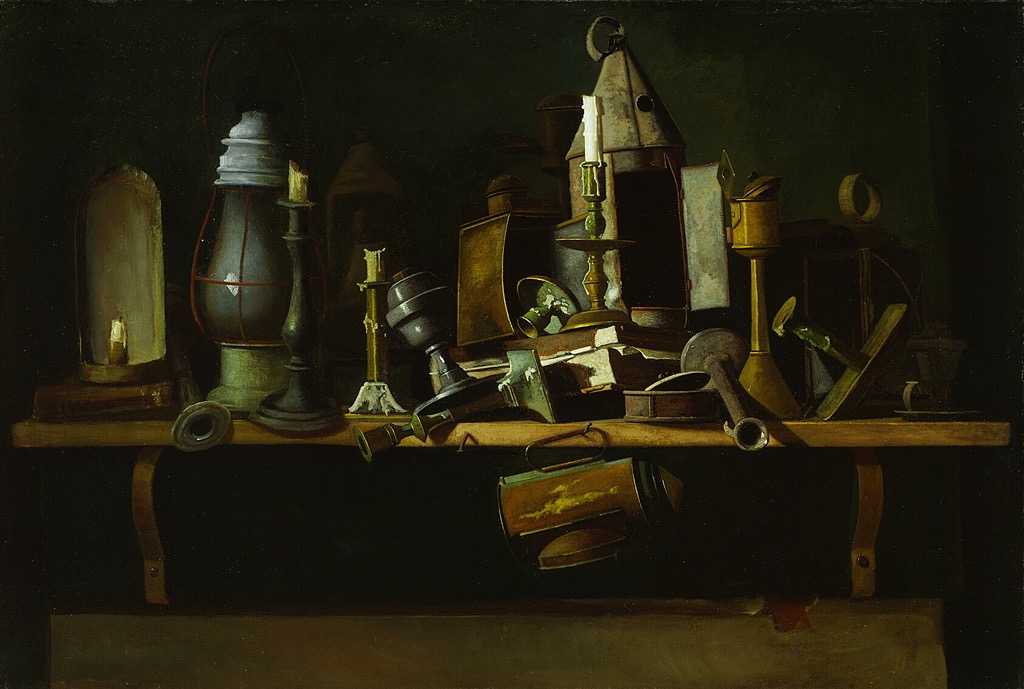
John F. Peto: Lights of Other Days (1906)
" … something I'd never anticipated appearing …"
I realized mid-afternoon yesterday that my head had stopped screaming. As if a gale had ceased, I first noticed the glaring absence, the disarming silence. I took this change to mean that I had popped through to the OtherSide, that I might have weaned myself off both nicotine and the drug that was supposed to help wean me off it, the second challenge the greater of the two. That drug had hijacked my brain. It screamed in response, producing a distracting background sound almost dominating the foreground as well. It was, as passages go, more tedious than difficult. I came to appreciate how The Gods staged this one, though, recalling the drug so no fallback prescription could be filled, so the addiction could not continue beyond the reach of that final half dose. I first felt betrayed, then cheated, before finally feeling blessed that fate had left me no recourse. If it was left entirely up to me, I doubt that I would ever change anything. Oh, I'd talk big but eventually backslide in secret, thickening my story and widening the gap between my public and my secret selves. Sometimes, though, circumstances align such that some genuine change slips through my defenses. I never know how to behave then, after finding myself standing on some OtherSide.
I recognize that I serve as my very own best personal change prevention specialist.
Experteazing
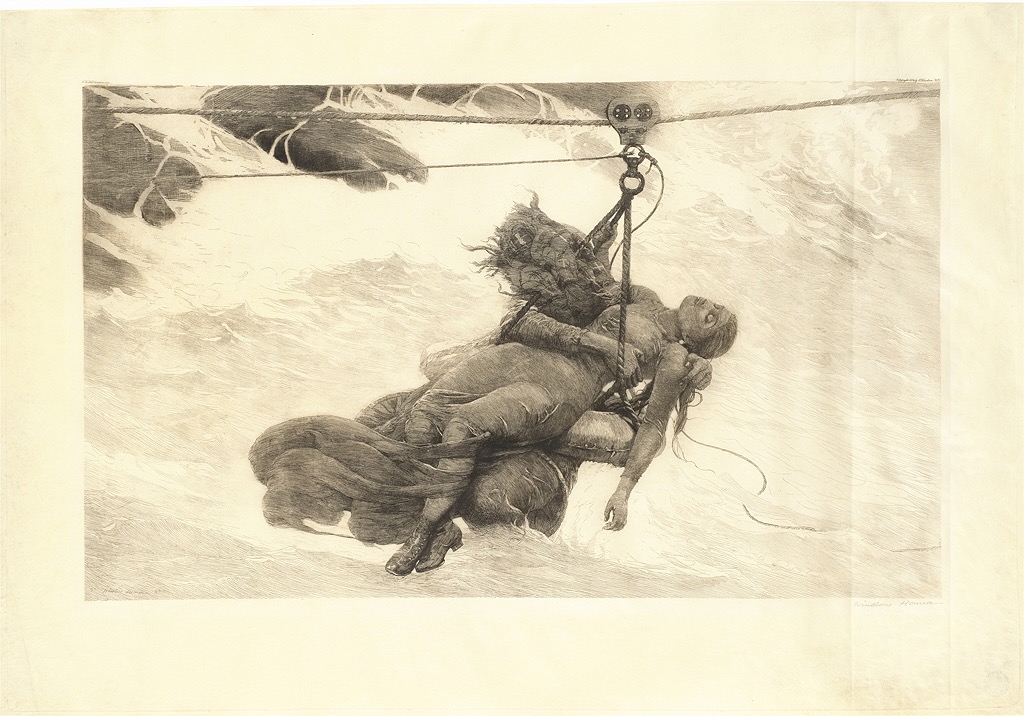
Winslow Homer: Saved (1889)
"I guess I want the mystery to persist beyond my intervention …"
Back when I still considered myself a consultant, I promoted myself by saying that I was "an expert at not being an expert." What skill was I hawking? My colleagues held impressive curricula vitae. I did not, yet my colleagues found my presence helpful in spite of or, perhaps, because of my lack of impressive formal orientation. Maybe I'd gained street smarts or perhaps, because of my lack of formal training, I just parsed the same old problems in unique ways. Maybe I was more of an expert than I sensed.
I never managed to codify what I knew or had experienced.
Blowin'ItUp
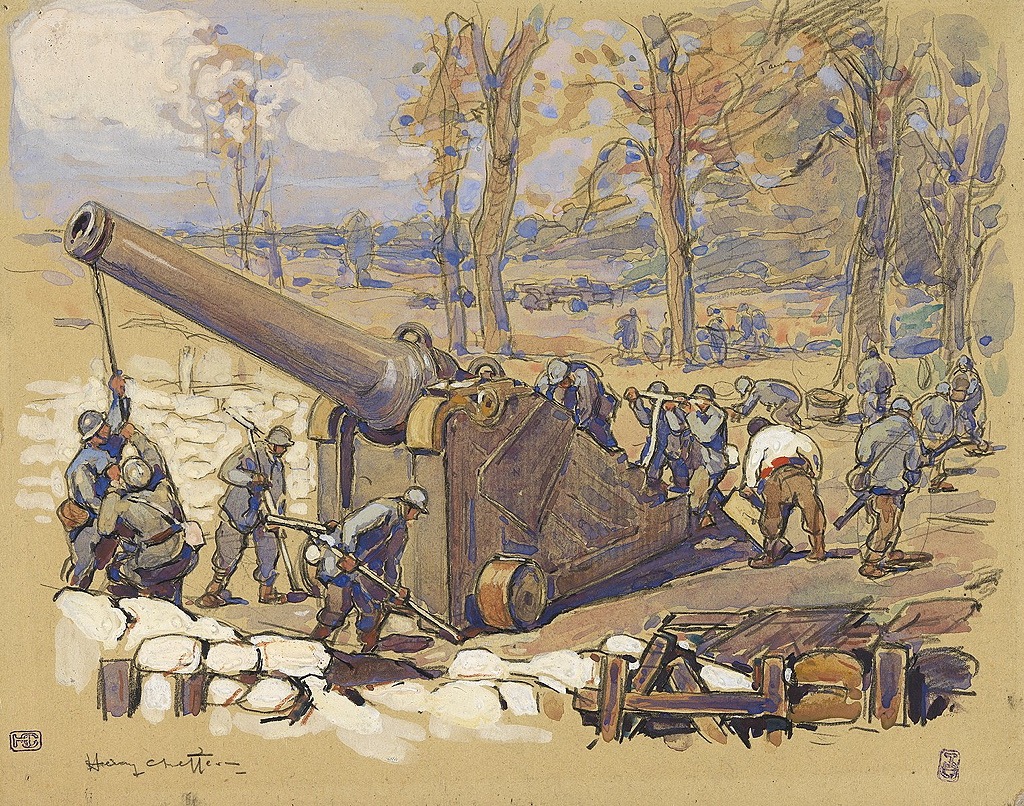
Henri-Lucien Cheffer: Soldiers and a Cannon (1915)
"'Twas always thus and still is."
Friday morning, 2am, I'd taken that remaining last half pill of the prescription I'd been given to help me break my nicotine addiction. I felt reasonably confident that I'd gotten past the worst of this withdrawal, eased by my patience, my common sense, and that prescription. I'd responded poorly to the drug at first, for it seemed to make my difficult situation worse, so I suspended taking it for a few weeks there in the middle, but as I began to feel more confident that I was successfully edging myself off the addiction, I reintroduced that medication into the mix. It hadn't made me feel so crazy that second round. I was down to just the drug, no secret supplemental placating the addiction. I'd ditched the source and had wisely left myself just this one recourse. When I reached the end of the prescription, I'd be done.
Halfway through that last day, though, I noticed myself sort of floating. My head was screaming something at me but my ears were fuzzy and I couldn't quite comprehend.
AttentionSpanning
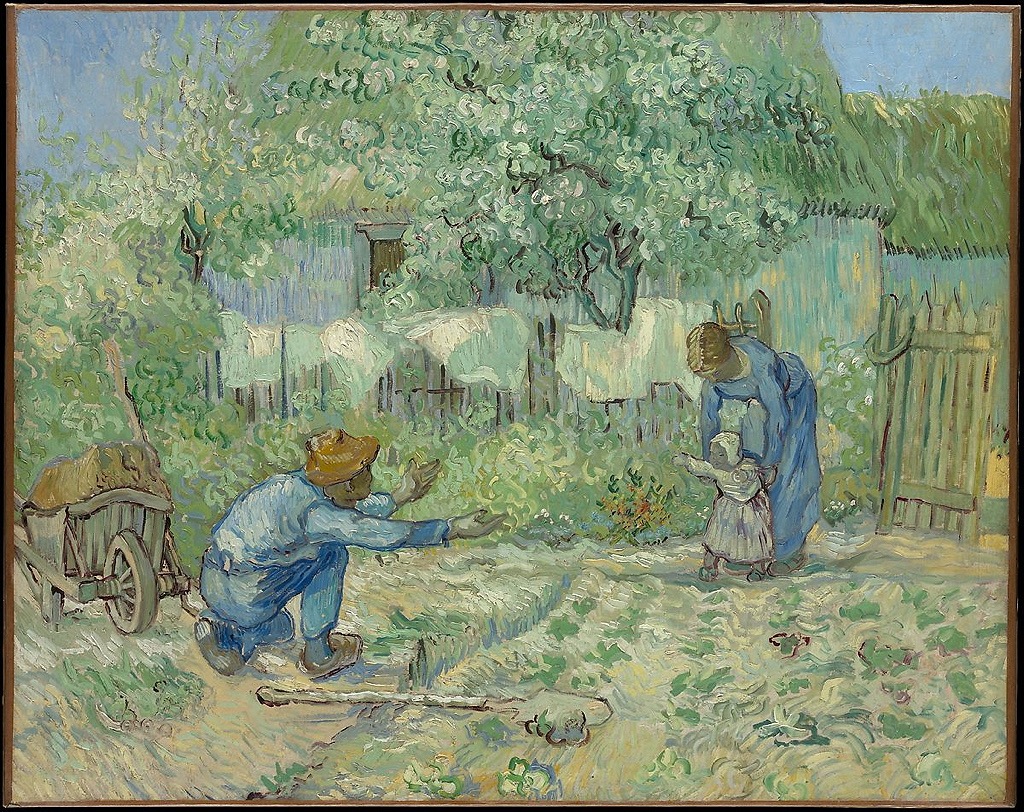
Vincent van Gogh: First Steps, after Millet (1890)
" … spanning a great chasm with my bottomless inattention."
Contemplating introducing direct dial service to the phone system, Bell Labs in the 50s sponsored a study to determine how long a phone number could be. People tend to have rather narrow memories. They might reliably remember five things consigned to memory but lose a few entries from a twenty item list. How long could a phone number become before most could no longer reliably remember it? The answer, one of the more famous and consequential answers in the annals of social science, turned out to be 'seven, plus or minus two.' This means that a phone number could be as long as nine digits without most people finding it impossible to remember. Better if it could be held to five digits, but still outward bound acceptable at nine. How long are phone numbers now? Ten digits, but ten made a little easier. Area codes almost don't count, since they tend to cluster around any individual location. Many people almost never dial another area code than their own, and many more restrict their calling to two or three adjacent ones, so the effective length of most phone numbers anchors at seven, perfectly within what the study suggested most would remember.
Some of us are more like dedicated threes on Bell Lab's scale, possessing well below average-sized iconic memories.
Paint

Johannes Vermeer: The Art of Painting (1666–1668)
"It's apparently never too late to try again to get closer to the ideal you'll never achieve."
HomeMakers struggle with no substance like they struggle with paint. Paint's different. It's permanent. Paint something, anything, and you produce a self portrait. Slopping it on produces a sorry legacy, indeed. It WILL outlive you. Mistreat it and it will mistreat you worse. One careless moment might haunt a HomeMaker forever. One fortunate experience might delight for just as long. A perfect cut between wall and moulding can appear every bit as exquisite as an Old Master's painting, and just a rare. No other substance offers so many ways to utterly fail when employing it. No other substance seems to somehow, at some time, end up in the hands of pretty much everyone. Who has not, poisoned by some slick promotional photo, decided to repaint some possession only to produce a regrettable result? Paint color cannot be reliably represented via photography. It varies by a thousand factors. It seems a subjective experience colored by context and preexisting preferences more than anything else. Paint remains a mystery to almost everybody.
Paint and I have history.
TheLastDay
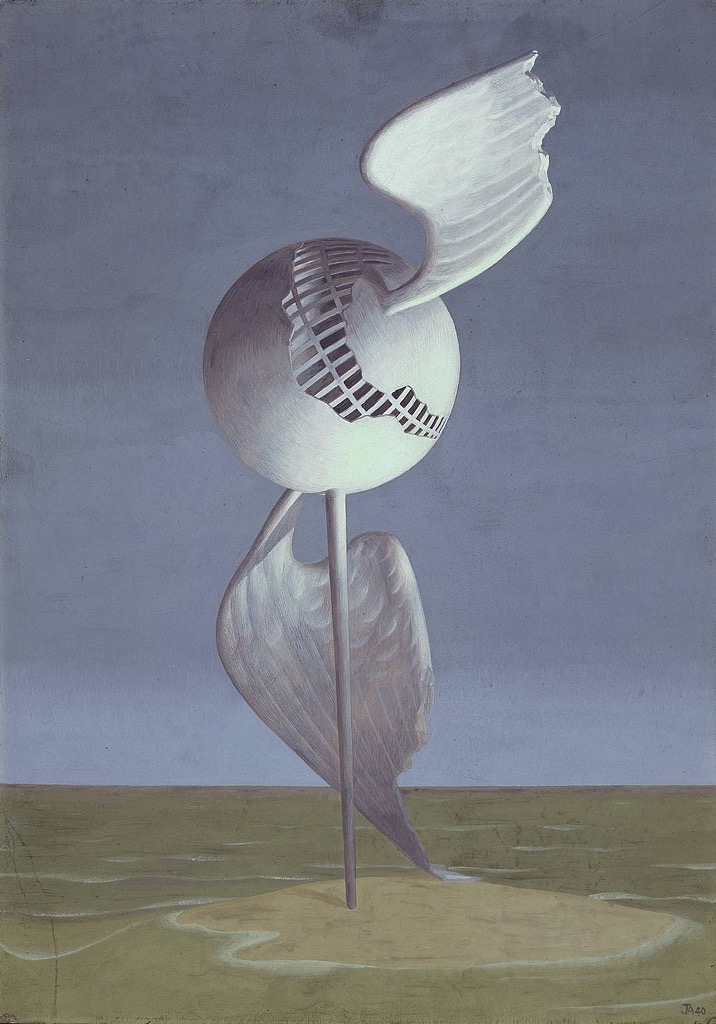
John Armstrong: Icarus (1940)
"Time to cut that old transition loose."
Today doesn't so much seem very much like the first day of the rest of my life, but more like TheLastDay of some soon-to-be former one. Refurbishing The Villa seems to have exacerbated this sense, for Our Painter Curt and I destroy something daily, each act subtly changing this context. It will never be the same again, again and again, such that I'm unsure just where The Muse and I are living right now. The end of our labor has not come anywhere near to being in sight. Nor can we really remember how it was just three very long weeks ago when we began this phase in earnest. We're suspended, former status quo shredded before us, stumbling forward, each day TheLastDay for something. No day a new day for anything yet, but a continuation of the perturbation, here to finish up what yesterday started and to destroy something forever again.
Many of the tasks I'm performing, largely little supporting roles beside Curt's star turn, are new to me.
Phublishing
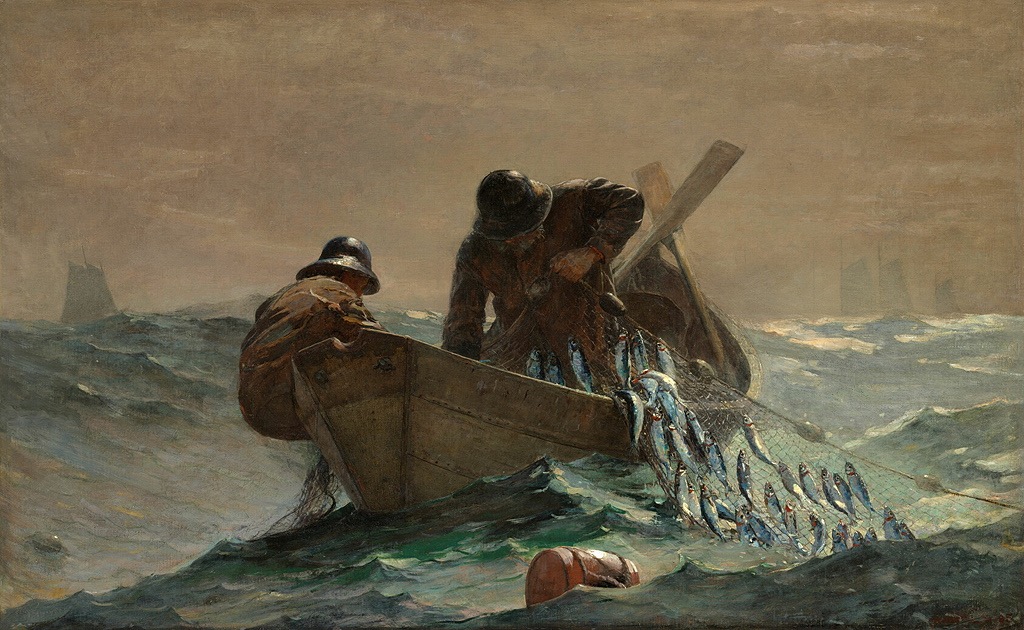
Winslow Homer: The Herring Net (1885)
" … maybe it was just meant to be precisely like this."
No news to anyone for me to declare that trolls live out there. A whole industry exists just to take advantage of others. The numbers of people engaged in this nefarious work seems to have increased through my lifetime, or maybe I've just grown more vulnerable as I've acquired possessions worth swindling. There are contractors who gleefully accept deposits then never show up to do the work. There are no shortages of deals that seem too good to be true, and are. Used cars. Lumber. Anything sold in the frozen food aisle. None of us are strangers to the charlatans circling our doors. Lies, damned lies, and statistics. Television advertising. Much of what passes as email these days represents phishing expeditions, others trying to harvest data you aren't aware you possess that someone, somewhere has figured out how to make an odd buck off of swiping. I willingly post to Facebook every morning, even knowing that they're plotting to do me in. I'm apparently being conditioned to cooperate in my own demise.
It should have been no surprise when that Phublishing company that recently contacted me out of the blue turned out to be untrustworthy.
CompleatIdiot

Illustration of a village idiot from The Firebird and the Fox: Russian Culture Under Tsars and Bolsheviks,
Freedom and the Fool (Chapter 1), Cambridge University Press, 2019 (Late 19th Century Russian)
"I remain grateful for how few brains are required to live the good life here."
Contrary to a popular misconception, I have not yet achieved the lofty label of CompleatIdiot. Oh, if only I could advance to that pinnacle, but I'm unlikely to ever get there, regardless of how diligently I pursue that goal. I settle for a more modest and fitting general idiot standing instead, one which serves most of the purposes of the CompleatIdiot status, anyway. I say that I'm not a CompleatIdiot without in any way intending to denigrate the native honor associated with the idiot designation, but to rather proudly include myself as a member in decent standing of this uniquely useful class comprised of the idiots of this world. Before I'd come to terms with just what an idiot I tend to be much of the time—not all of the time, mind you, for the ability to perform continuous idioting belongs only to CompleatIdiots—I'd try to hide my little secret as if it was really a secret to anyone watching me perform. An utterly fruitless effort, but one I still felt compelled to engage in, for I imagined that if others knew the truth about my native deep down idiocy, they might think less of me. My sense of inadequacy bloomed, anyway, for no-one successfully fools those in the presence of a genuine idiot. Only after I came to accept this secret as already public knowledge, did I start discovering its power.
The idiot holds advantage in innumerable ways.
Oftening

Anonymous: from New Impression: Children at Play, woodblock print book (ca. 1875)
" … maybe it's just me who's overseeing …"
Repeat any activity an uncertain number of times and besides acquiring a habit, you might discover boredom. We work hard to develop routines before setting out to revile them. Vacations have long been held as an antidote to too much sameness, though through This Damned Pandemic, vacations have proven chancy and easily foregone. We've escaped a few times in recent months to see my sons and grandkids, observing strict guidelines: wearing masks, waiting forever for the hotel elevator so only us two would be on it, eating take-out, avoiding crowds. The protocols seem just as tedious when away from home as they've become at home, and there's really no escaping them as another unsurprising surge overtakes us, this one apparently more virulent than any previous. Only one of my face masks remain intact after a year and a half of continual use. The other two have started splitting, an Oftening effect, no doubt, suffering from too much of what they were designed to do. There are apparently limits.
My weekend routine has been changing since we started remodeling in earnest.
Promoting

`Hanabusa Itchô. : "Blind monks examining an elephant" from Itchô's Freestyle Album (Itchô kyôga shû).
Niigata: Meguro Jûrô (1888) Woodblock-printed book.
"Is it my vanity that so soundly rejects seduction from the vanity penny press?"
A week ago, I missed an incoming call. I uncharacteristically called back to find myself trapped in a conversation I had not anticipated and in fact had been avoiding. The woman on the other end had been trying to contact me about republishing my best selling book under her company's imprint, though my The Blind Men and the Elephant (Berrett-Koehler 2003) remains in print. As she prattled on about the many benefits her operation offered, I recognized that she represented what's referred to as a vanity press, one where the author pays for publication of an edition destined to never sell. This one relies upon remarkably low prices—ninety-nine cents a copy—to entice people who might not ever read a book to buy it. Why not? A network of self-selected book reviewers each receive a free copy in the probable delusion that they might value that gift enough to write a glowing review of it. Tens of thousands of frequent ebook readers are likewise offered special give-aways and deals in an attempt to inflate readership into the noteworthy range. As I listened, I wondered how she'd gotten ahold of my phone number. I was on the phone with a junk caller.
I mentioned that I write four books each year and that comment seemed to perk up her ears.


